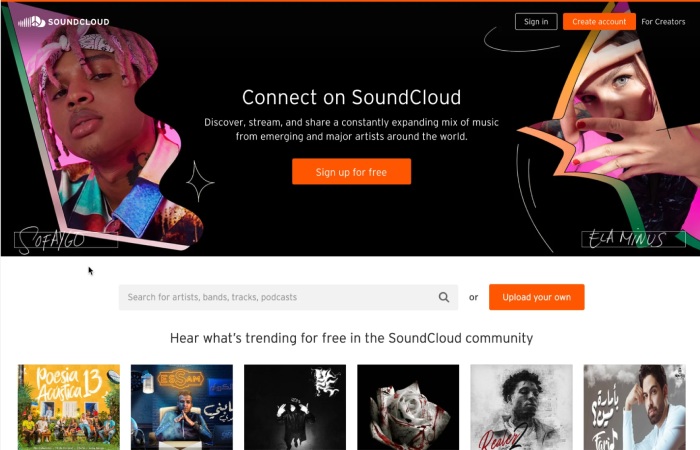Introduction
SoundCloud – In a world inundated with music streaming services, SoundCloud stands out as a platform that has redefined how we discover and consume music. Established in 2007, SoundCloud has become a haven for independent artists and music enthusiasts. With its unique features, user-friendly interface, and commitment to supporting emerging talent, SoundCloud has carved out a niche in the music industry that continues to grow in prominence. This article explores the history, impact, and future of SoundCloud.
The Genesis of SoundCloud
SoundCloud was founded by two Swedish musicians, Alexander Ljung and Eric Wahlforss, with a vision to create a platform that allowed artists to share their music easily. It began as a modest project, but their ambition soon led them to Berlin, where they established SoundCloud’s headquarters. The platform officially launched in 2008, quickly gaining traction among musicians who sought an alternative to traditional record labels and radio stations.
A Home for Independent Artists
One of SoundCloud’s most significant contributions to the music industry is its role in empowering independent artists. Unlike major streaming platforms prioritizing established artists, it provides a level playing field for newcomers. Independent musicians can upload their tracks, build a fanbase, and reach a global audience without a record label’s backing. This democratization of music distribution has allowed countless artists to succeed on their terms.
Features and Functionality

Music Upload and Sharing
SoundCloud allows artists to upload their music, making it accessible to a global audience. Artists can share their tracks easily through social media and embed them on websites and blogs.
Community Interaction
Users can comment on specific track parts, fostering community and enabling constructive feedback. This interactive feature has proven valuable for artists looking to refine their work.
Playlists and Reposts
Users can create playlists to curate their favorite tracks and follow other users’ playlists. Reposting allows for sharing ways with one’s followers, boosting visibility.
Charts and Discovery
SoundCloud’s charts showcase trending tracks, helping users discover new music. The platform also delivers personalized recommendations based on listening history and preferences.
User-Generated Content and the Rise of Remix Culture
SoundCloud is celebrated for embracing user-generated content and remix culture. Musicians, producers, and even fans can upload their versions of songs, creating a vibrant ecosystem of creativity. Remixes and mashups have become a hallmark of SoundCloud’s, fostering collaboration and innovation within the music community. The platform’s relaxed approach to copyright has been both a blessing and a challenge, as it encourages artistic freedom and raises legal concerns.
Impact on the Music Industry By SoundCloud

Empowering Emerging Artists
SoundCloud has consistently shown its commitment to supporting emerging artists. Initiatives like “SoundCloud Premier” and the “Repost” program provide musicians with monetization options and marketing support.
Networking and Collaboration
Artists can connect and collaborate with others on SoundCloud, fostering a creative community. It has led to numerous successful collaborations and the discovery of fresh talent.
Feedback and Iteration
SoundCloud’s comment system allows artists to receive valuable feedback, enabling them to improve their work and engage with their audience more effectively.
Challenges and Competition Of SoundCloud
While SoundCloud has undoubtedly transformed the music landscape, it has faced many challenges. The platform’s copyright policies have been contentious, leading to lawsuits and takedowns of copyrighted material. It has had to strike a delicate balance between fostering creativity and respecting intellectual property rights.
Moreover, the streaming music industry is highly competitive, with giants like Spotify, Apple Music, and Amazon Music dominating the market. SoundCloud’s unique features and focus on independent artists have allowed it to maintain its niche, but it continues to face pressure from larger competitors. To thrive in this environment, SoundCloud must continually innovate and adapt.
Monetization and Sustainability
- One of the critical challenges for SoundCloud has been monetization. While it has introduced several monetization options for artists, it still struggles to achieve profitability as a company. The platform offers free and premium subscription plans, with the latter offering additional features and an ad-free experience. However, converting free users into paying subscribers remains challenging, especially in a market dominated by major players.
- SoundCloud’s sustainability also relies heavily on advertising revenue. The platform must maintain a substantial user base and engagement levels to attract advertisers. The delicate act that SoundCloud must carefully navigate is balancing the need for advertising revenue with the desire to provide an enjoyable user experience.
The Role of SoundCloud in Shaping Music Trends

SoundCloud has played a significant role in shaping music trends over the years. It has been a breeding ground for new genres, such as “SoundCloud rap” and “bedroom pop.” These subcultures have emerged from the platform’s ability to amplify niche sounds and allow artists to experiment. Artists like Post Malone and Billie Eilish gained initial recognition on it before achieving mainstream success, underscoring the platform’s influence on the industry.
Future Of SoundCloud
As SoundCloud looks to the future, it faces both opportunities and challenges. The company must innovate to stay relevant in the ever-evolving music streaming landscape. Here are some key areas to watch:
- Monetization: SoundCloud must refine its monetization strategies to attract artists and subscribers. It includes improving conversion rates for premium plans and finding new ways to generate advertising revenue.
- Copyright and Licensing: Maintaining a balance between artistic freedom and copyright compliance. SoundCloud must work closely with artists, labels, and copyright holders to ensure a fair and legal environment for music sharing.
- Competition: SoundCloud must differentiate itself from larger competitors by focusing on its unique features, like user-generated content and remix culture. Finding a niche within the broader music streaming market will be essential.
- Support for Emerging Artists: Continuing to support emerging talent through programs like “SoundCloud Premier” will help the platform remain a go-to destination for independent artists.
- Innovation: SoundCloud should stay ahead of the curve by embracing emerging technologies, like virtual reality concerts or blockchain-based royalty distribution, to enhance the user experience and support artists.
Conclusion
SoundCloud has not only revolutionized music discovery but has also given a voice to countless independent artists worldwide. Its commitment to democratizing music distribution and fostering creativity has left an indelible mark on the music industry. While it faces challenges from competitors and copyright concerns, SoundCloud’s unique features and dedication to emerging artists position it for a bright future. As it continues to evolve and adapt, SoundCloud will likely remain a vital force in the music landscape, shaping trends and supporting artists in their musical journey.

